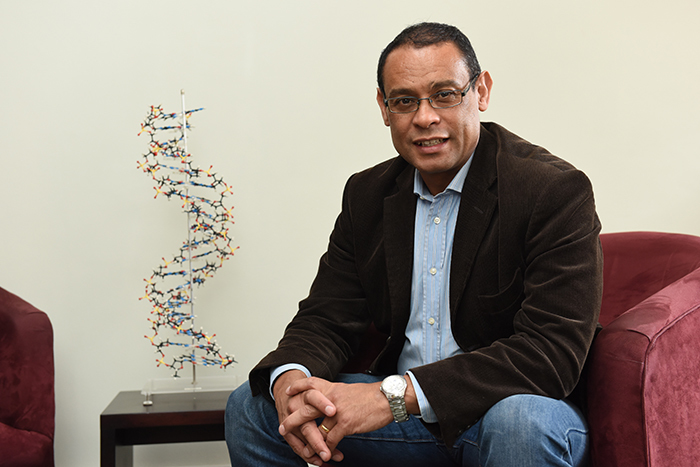Kevin Naidoo: Computing, carbohydrates and cancer
23 September 2016 | Story by Newsroom
What exactly is scientific computing and how is Professor Kevin Naidoo using it to better understand how disease works?
Professor Kevin Naidoo's research takes place at the intersection of biology, chemistry, statistics and mathematics. At UCT's Scientific Computing Research Unit, where he is director, he uses informatics and computer-modelling techniques to interrogate data and simulate complex molecular processes in disease. At present this includes his work on identifying cancer sub-types and isolating the key molecular signatures of different kinds of tumours. Or, in his own words, his work is all about the three C's – computing, carbohydrates and cancer.
“There is a deep connection between carbohydrates and disease,” he explains. “In the past, research focused mostly on the role of DNA and proteins. I am interested in the role of carbohydrates, which coat the cells of all living organisms, in human health. It turns out that much of the cellular communication is due to the very complicated carbohydrate systems that coat the outsides of cells and that trigger important biological events.”
According to Naidoo, it has only been in the last five years that he has been able to start answering some of the questions that have preoccupied him for years.
“Before that, the computing side of things was not really available. In order to ask the questions I wanted to, I first had to spend a decade building the tools that I needed, in the form of software,” he explains.
This software development programme has been made possible in part by the research chair in scientific computing awarded to him since 2007.
The result has been a slew of breakthroughs, both in the applications of scientific computing and cancer research, as well as several patents for the processes that Naidoo has invented. To date, Naidoo and his team, primarily Dr Jahanshah Ashkani, have analysed the data of more than 1 800 patients using extracted RNA from tumours. Running this data through statistical models, they have shown that each kind of cancer displays tell-tale 'signals'.
What does this mean for individuals? According to Naidoo, the impact is twofold.
“Firstly, in the case of cancer, early diagnosis is crucial. Our work paves the way for more accurate and earlier diagnosis by being able to detect the specific 'signals' that we have found are associated with specific cancers. Secondly, our research can be used to refine cancer identification. Many cancers have whole families of subtypes. There are four kinds of breast cancer, for example. Knowing the exact subtype leads to more effective treatment,” he says.
Past, present and future
So how did Naidoo get into such a specialised field of study? The way he tells it, he should add curiosity to his list of Cs.
“I was always a curious kid and something of an intellectual. I arrived at UCT in 1983 – at that time, of course, I had to get a special dispensation from FW de Klerk.”
At first, Naidoo studied chemistry and maths, but while doing his master's degree in chemistry he became interested in the computational side of chemistry, a fledgling field in South Africa at the time.
“I was always less interested in making molecules and more interested in finding out how modelling could help us understand how molecules work,” he explains.
After completing his MSc at UCT, he did a PhD at the University of Michigan in computational chemistry and followed this with a postdoctoral stint at Cornell University. He returned to South Africa with an express desire to participate in the country's transformation.
When it comes to his own work specifically, he also believes that we are entering a fourth industrial revolution, in which computers become virtually integrated in our everyday experience of the world.
“In the last two or three decades, as everyone knows, the role of computers in our lives has been completely transformed,” he says. “Now we are seeing an integration of the digital with the physical world, which is very exciting.”
Naidoo also hopes that more students will join the field in which he is a pioneer.
“This work has many possible applications,” he says. “The people who come after me will be able to use this technology to perhaps design new materials, or find solutions for other diseases from the analysis of carbohydrate enzymes in blood. This is only the beginning.”
Story Ambre Nicolson. Photo Michael Hammond.
RC&I also acts as the liaison between UCT's research community and the private sector with regards to intellectual property, commercialisation and business development activities.
RC&I has helped to transfer numerous technologies from the university laboratories to industry both locally and internationally.
Visit the RC&I website...
Innovation at UCT 2016: Inventor interviews.
Impact through Innovation: Prof Kevin Naidoo.
 This work is licensed under a Creative Commons Attribution-NoDerivatives 4.0 International License.
This work is licensed under a Creative Commons Attribution-NoDerivatives 4.0 International License.
Please view the republishing articles page for more information.










